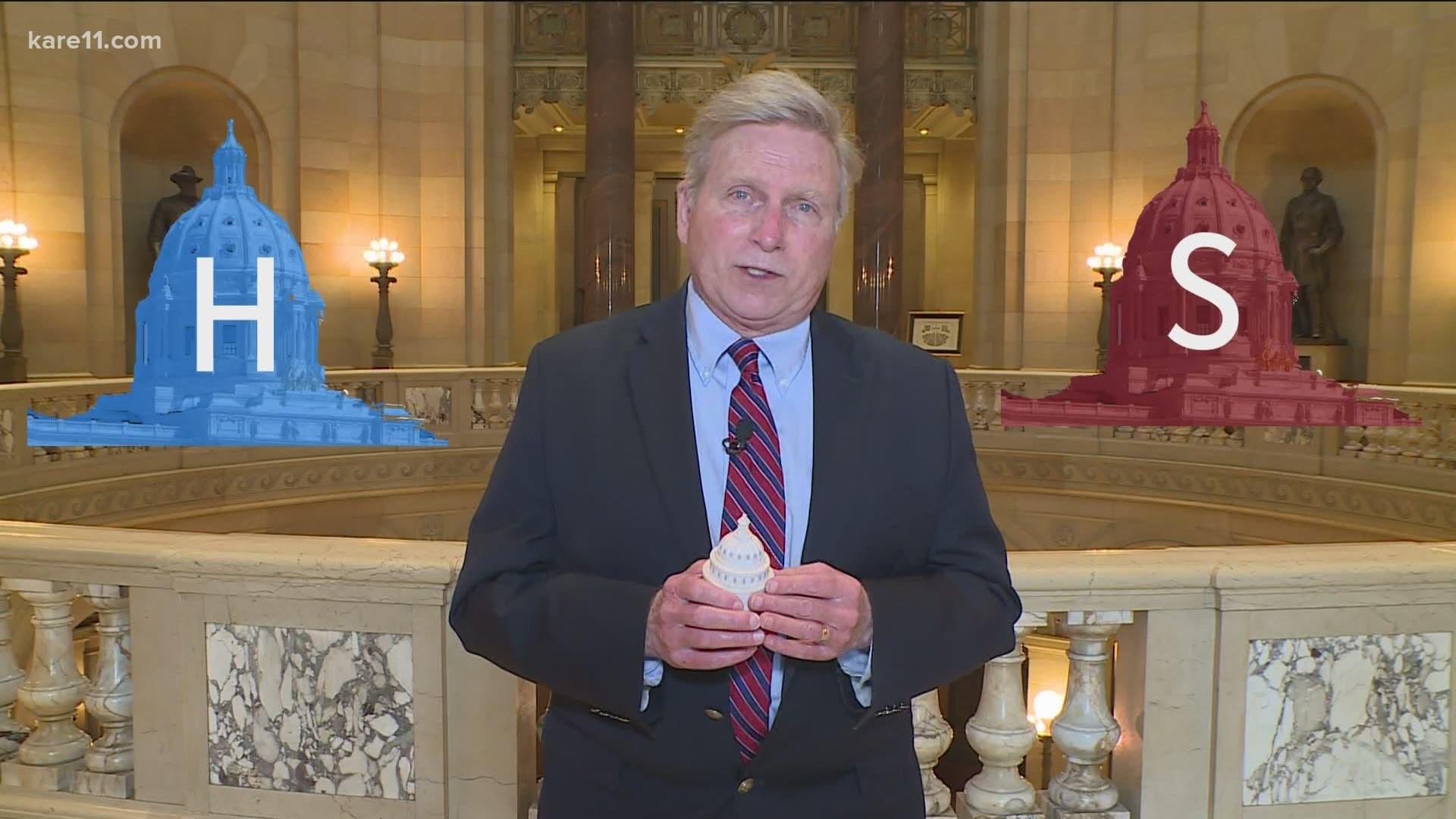ST PAUL, Minn — There's a growing consensus that Minnesota lawmakers won't be able to get a budget passed before the session ends Monday. They'll need to meet in a special session, most likely during June, to wrap up their work and thereby avoid a state government shutdown in July.
The State Capitol's "Big 3" - Gov. Tim Walz, Republican Senate Majority Leader Paul Gazelka and Democratic House Speaker Melissa Hortman - continued to hold private negotiations behind closed doors in hopes of crafting overall budget targets.
Senate Leader Paul Gazelka held out hope Friday afternoon a deal could be reached during the weekend, even with the governor spending part of his time at the fishing opener in Otter Tail County.
"We’re doing our best to try to find a budget that works best for everyone. So, we are having very productive conversations about federal stimulus money and other thorny issues," Sen. Gazelka told reporters.
But Gazelka acknowledged even if that happens Saturday or Sunday, it would still take too long for committees to finish processing all of the bills, pass them and get them voted on in both the House and Senate before the constitutionally-mandated final day of session midnight Monday.
House Speaker Hortman had essentially said the same thing a day earlier, that the sheer logistics of buttoning up more than a dozen budget bills and moving them through session calendars - complete with long debates - would be impossible by midnight Monday.
Simply put, there are too many moving parts and too many divisive issues still in the mix. And reaching a deal on spending targets is just one obstacle. The Republican-controlled Senate and the DFL-controlled House have major policy differences that must also be resolved before they call it a day.
Senate Minority Leader Susan Kent expressed frustration that some conference committees had simply just stalled while they waited for the Big 3 to reach a deal.
"It doesn't mean we put everything on hold. It doesn't mean we don't have conference committee hearings; we don't adopt provisions, we don't keep negotiating the things where we're close," Sen. Kent remarked Friday.
"There's no reason for us to push everything off until June."
Minnesota has the only divided legislature in the country - the House of Representatives is controlled by Democrats, while the Senate is controlled by Republicans. Gov. Walz, as a Democrat, tilts the balance of power toward the House, but all three sides of the triangle have to agree on every piece of legislation that becomes law.
So, you already begin with a recipe for going into overtime session. And the COVID pandemic also played a role in slowing things down.
Most of the legislature's committee work was done remotely with lawmakers, staff members and witnesses taking part in remote Zoom-style hearings and meetings. That added to the complexities of passing a two-year $50 billion budget.
COVID relief money from the federal government also played a role in disputes because there was a lack of clarity about exactly how some of that money could be used. There was also a philosophical difference between lawmakers on whether those one-time federal relief dollars could be spent augmenting ongoing expenses.
And even the term "budget" oversimplifies things. It's actually composed of more than a dozen smaller budget bills covering specific parts of the state's operations, including transportation, health and human services, public school aid, higher education, public safety and more.
The House and Senate each pass their own versions of all those budget bills. It then falls on House-Senate conference committees to blend those House and Senate bills into a hybrid piece of legislation that can gain enough support to pass both chambers without any amendments.
But those conference committees can finish work on those joint House-Senate bills until the Big 3 reach a deal on the overall budget targets. That's known as the "global agreement" on how much the state will spend in the next two years and how much it will collect in tax revenue.
Unlike the federal government, Minnesota's state government can't borrow money to pay for operating expenses. Lawmakers must pass a budget that will limit spending to less than what the economic experts predict the state will collect in taxes during that two-year period.
In this case, lawmakers are passing the FY2022-2023 budget. It will cover the two-year period beginning July 1, 2021 and ending June 30, 2023.
And once they solve the money part of the puzzle, they've still got to deal with policy disputes. For example, the House has passed several police reform measures the Senate hasn't accepted. And the Senate passed a Voter ID bill that the House won't embrace.
There are also "budget hostages" for lack of a better term. For example, Republicans have threatened to block the Environment and Natural Resources budget bill unless Gov. Walz delays implementation of his Clean Cars Minnesota initiative.
That would deny the DNR its operating budget, which would translate to Minnesota State Parks closing down in July.
The Senate GOP has insisted that Gov. Walz give up his peacetime emergency powers and sign a bill that would require legislative approval to extend any emergency beyond 30 days.

